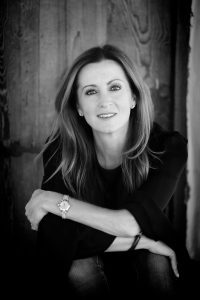Juli Goodwin: Entertainment Industry Trailblazer

Published on March 12, 2020 at 9:26 p.m.
by Hannah Taylor.
You know those people who seem to have more than 24 hours in a day? Juli Goodwin is one of them. Goodwin wakes up at 5:30 a.m., prepares for the day, then drives to a barn in Burbank, California, where she rides horses — all before heading to her job as the chief communications officer of the American Film Institute. A lifelong rider, Goodwin said her morning jaunt at the stables is a great mental exercise. She also often attends a yoga class in the evening.
“Sometimes I’ll change clothes and take showers two or three times a day … I like to have a really full plate,” she said.
Goodwin likened her physical activities to “bumpers” — a break from her consistently busy schedule to focus on interests unrelated to work.
“No matter what your passion is, if you pursue that, you’re just better at everything,” Goodwin said, noting that the key to an effective work-life balance is being intentional and drawing boundaries.
“It’s about working really hard, working smart and figuring out how to meet the needs of the job, but also your personal needs,” Goodwin said.
Goodwin stepped into her position with AFI just over 18 months ago, after serving as the executive vice president of domestic publicity for Warner Bros. for seven years.
“Transitioning from the studio to my current job was a little scary,” Goodwin said. “I had worked in the studio system forever, and contemplating a change was something that kept me up at night. I’m so happy that I did it, but it was definitely a challenge to take myself out of my comfort zone after all that time (at Warner Bros.),” she said.
On her career
You would be hard-pressed to find someone who has had a more impressive career ascension than Goodwin. A mere four years after graduating from Loyola Marymount University with a bachelor’s degree in psychology, Goodwin joined Fine Line Features (the former specialty film division of New Line Cinema) as its vice president of publicity and promotions.
Five years later, Goodwin joined Warner Bros. as a vice president, responsible for a “portion of the film slate, award consideration campaigns, written communications, the photo and audiovisual department as well as the events team,” her résumé states. She subsequently became the studio’s senior vice president of domestic publicity, and eventually rose to become executive vice president of the same division. During her time at Warner Bros., she worked on numerous campaigns, including those for Oscar best picture winners “Argo” and “Million Dollar Baby.” The root of her success? Hard work.
“Hard work creates opportunity,” Goodwin said.
“I read all the books and scripts; I write all the reports,” she said, attributing her many leadership positions to never taking shortcuts.
True to her unfailing work ethic, Goodwin wasted no time in entering the PR industry post-college. She graduated on a Friday, and the following Monday, Goodwin started her career as an assistant at boutique agency Clein + White. She said this decision to jump right into the workforce was one of the most important factors in her rapid progression.
“Getting going fast and not necessarily knowing what I was getting myself into, but having faith that it was a good idea was one of the biggest moves that I made,” she said.
Before transitioning to Warner Bros., Goodwin spent the first five years of her career working with independent films. Indie films are less resourced than their studio film counterparts, so the process of promoting them gave Goodwin the opportunity to work with a variety of media, including print, broadcast and digital.
“When I got to (Warner Bros.), I wasn’t looking to be put in any one siloed position,” she said. “I knew I wanted to have a bigger overview of the campaigns, and coming out of an independent environment, I had the skills to do that. I had a really good sense of the grassroots and marketing aspects (of campaigns), not just the publicity pieces. I was equipped to move up the ladder,” Goodwin said.
On her typical day
Before Goodwin leaves her house in the morning, she checks all of her texts and emails, “just to make sure nothing is on fire that needs (her) immediate attention.” As the morning rolls on, she typically has a meeting, either a staff check-in or creative review. Aside from these standing meetings, Goodwin’s days vary depending on “what cycle (her team is) in,” whether they are preparing for an event AFI is hosting or a board meeting.
“My favorite days are when I have a little bit of headspace to actually do some future planning where I can be tackling bigger topics that aren’t so immediate,” Goodwin said. “I get a lot of that time, (because) I have a great team of people that work here with me.”
Steve Pepdjonovic, director of marketing and communications at AFI, is part of Goodwin’s “great team of people.” He has worked with AFI for seven years, and nine months ago he stepped into his current role.
“I met Juli on her first day at AFI,” Pepdjonovic said. “My first impression of her was ‘here’s someone who has all the qualities of a leader that (AFI) needs.’”
Pepdjonovic handles AFI’s digital and editorial content creation, as well as managing any written work the company produces. He and Goodwin keep in constant communication and spend 70% to 80% of the day together, Pepdjonovic said. He attested to Goodwin’s impact on AFI over the course of her 18 months with the organization.
“She’s led the Marcom team through many major projects since she’s been at AFI, including guiding the organization through an extensive website redesign, a very successful advertising campaign for the AFI Conservatory, and right away recognizing the need to prioritize refining the institute’s branding and the language around our mission,” Pepdjonovic said.
Working so closely with Goodwin, Pepdjonovic gets to see firsthand how she leads.
“She’s very collaborative and has great instincts,” Pepdjonovic said. “She wants everyone to chip in, to discuss any idea and pull it apart, with the goal of making everything the best that it can be.”
On her three pieces of advice to young PR professionals
1. Be curious. — “Ask every question. If the job that you’re doing is not provoking you to think about new things and new ways to do stuff, then you’re in the wrong job. I think (curiosity) is a really essential element to growth.”
2. Don’t be afraid of hard work. — “You’re going to have to do it. You’re going to have to work hard. You have to be willing to put in that kind of effort.”
3. Find balance. – “It’s important that you’re living a life that is really fulfilling outside of your office, but when you’re in your office, it’s important that you’re really digging in there, too. Finding that balance is really important.”
On mentorship
Goodwin said she tries to mentor a lot of young women, an effort accomplished in a variety of ways.
“One (way of mentoring) is just by your presence,” Goodwin said. “By showing up to work every day, you’re providing a visual reference for other people. They see in you the possibility of where they can go.”
Goodwin also aims to mentor young women by having intentional conversations and helping them with their careers.
“I feel like it’s my obligation to offer back the connections that I have,” she said. “I try to do that as much as I can. See one be one. We have to lay some groundwork so people can aspire to these jobs.”
On being underestimated
As a corporate leader in the entertainment industry, Goodwin is no stranger to the difficulties women face in the workforce.
“There are aspects of the industry that are very challenging for women,” Goodwin said. “I’ve made it my business, as I continue to progress, that I create safe environments for everybody that works for me,” she said.
Goodwin said that she endeavors to view sexist behavior as a limitation on the male’s side, not the other way around.
“(Men) may, in a lot of cases, really underestimate what you as a woman are bringing to the table,” Goodwin said. “I know what I’m capable of, and I know what I’m bringing to a campaign.”
Goodwin said she views workplace discrimination not as a gender-based problem to overcome, but as an opportunity to prove her abilities.
“It’s about me working hard and me using all of the intelligence and experience that I have to solve the problem,” she said. “It’s also about being aware when you’re being marginalized and not accepting that behavior; when I have had that circumstance, it just makes me want to dig in a little deeper and prove the fact that I have every right to be at those tables,” Goodwin said — and prove it she has.




